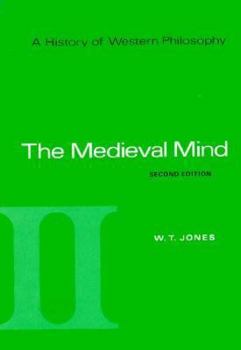A History of Western Philosophy: The Medieval Mind, Volume II (A History of Western Philosophy)
Select Format
Select Condition 
Book Overview
A HISTORY OF WESTERN PHILOSOPHY examines the nature of philosophical enterprise and philosophy's role in Western culture. Jones and Fogelin weave key passages from classic philosophy works into their... This description may be from another edition of this product.
Format:Paperback
Language:English
ISBN:0155383132
ISBN13:9780155383135
Release Date:March 1969
Publisher:Wadsworth Publishing
Length:355 Pages
Weight:1.20 lbs.
Dimensions:0.7" x 6.2" x 9.0"
Customer Reviews
2 ratings
Thought and faith interwined or intangled...
Published by Thriftbooks.com User , 21 years ago
This book, 'The Medieval Mind', is the second volume of a five-volume series on the history of Western Philosophy by W.T. Jones, professor of philosophy in California. This series is a very strong, thorough introduction to the course of Western Philosophy, beginning at the dawn of the philosophical enterprise with the pre-Socratics in ancient Greece to the modern thinkers such as Wittgenstein and Sartre. It has grown, over the three decades or so of its publication, from one to four then to five volumes. It has remained a popular text, and could serve as the basis of a one-year survey of philosophy for undergraduates or a one-semester survey for graduate students. Even advanced students in philosophy will find this valuable, all major topics and most minor topics in the course of philosophy are covered in these volumes.Jones states that there are two possible ways for a writer to organise a history of philosophy -- either by addressing everyone who ever participated in philosophy (which could become rather cumbersome if one accepts the premise that anyone could be a philosopher), or to address the major topics and currents of thought, drawing in the key figures who address them, but leaving out the lesser thinkers for students to pursue on their own. Jones has chosen the latter tactic, making sure to provide bibliographic information for this task. This volume, 'The Medieval Mind', starts where the last volume leaves off, as the classical world, in the form of the Greek and then Roman Empire, the organising principles for the Western world for nearly a thousand years, were beginning to crumble. Into the strenth of the Roman Empire the originating events of the Christian faith came about, but it wasn't for a few centuries that Roman rule was waning and the rise of Christendom, politically and intellectually, was taking its place. Much of medieval philosophy is directly the result of people in the church (at that time adminstratively and ideally an undivided church, despite the fact that the already-sown-seeds of the East/West split and the many heretical factions argue against that interpretation). If the two primary figures in classical philosophical thought were Plato and Aristotle, the two primary figures in medieval philosophy parallel them in Augustine and Aquinas, and in an interesting historical progression, Augustine grew largely out of Plato, and Aquinas developed his thought through the reintroduction of Aristotle into Western thought centuries later.Between these two major figures, philosophy and intellectual development was not dead, but there was a seeming hibernation in what tends to be termed the Dark Ages. However, it was during this period that the beginnings of the university as a scholarly place took place, and such intellects as John Scotus Erigena appeared occasionally. This was a world in which the division between philosophy and theology was unthinkable. Our more modern sense of division of academic disciplines d
A Clue Into How We Got Into This Mess
Published by Thriftbooks.com User , 24 years ago
Recent knotty questions regarding knowledge and certainty prompted me to dust off my copy of Jones' book and revisit pages not looked at since university days in Hawaii. It was a pleasure to find again the important issues and questions seriously considered: is there a God? Does evil exist? What are the limits of free will? What is "salvation?" Who is supreme, the individual or the state? What constitutes a valid ethical system and from what authority might it be derived? What is the proper balance between faith and reason? What is the preferred political system? What is the nature and future of man?Once again I was amazed at the Professor's ability to sift through a sea of historical and technical detail, identify core concepts, follow them as they thread their way through the interval under consideration and relate them to the present time. His objectivity is consistent and his writing is not intrusive--it's as if the reader is engaged in direct personal research. His language is concise and not pedantic--this layman had no difficulty following his presentation of the various controversies characterizing medieval philosophical discourse.The book ranges from the first century A.D. through the end of the period sometime in the 14th century. It addresses, among other things, the interplay of Jewish tradition and classical thought during the formative years of Christianity. An overview of the development of society, culture and a coherent worldview prepares the reader for a bracing survey of Thomism, including his metaphysics, psychology, ethics and politics. In closing the book, Jones details the subsequent critiques of Thomism developed by Bacon, Duns Scotus, William of Occam, et al.For those desiring greater detail the author presents numerous footnotes to each chapter and a wide-ranging "Suggestions for Further Reading" section. Not a professional philosopher? No problem: an excellent glossary is also included. In short, anyone interested in more than a superficial, pop-culture view of the ideas that underly our "post-modern" age must consider this book. It fits neatly in the bookshelf of the academic as well as the layman--an excellent book, most excellent.





